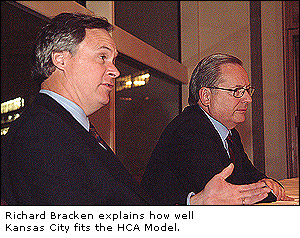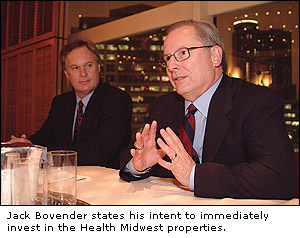A dollar may not go as far as it used to, but rest assured, people pay attention when you walk into town with nearly two billion of them. That’s right, billion.
HCA Chairman and CEO Jack Bovender, jr. has gotten used to the attention. He has stepped onto the Kansas City scene with an imprint best measured on a Richter scale.
With its planned purchase of the ailing Health Midwest, the area’s largest healthcare provider, HCA will pump more fresh dollars into the local economy than any company in recent memory—a cool $1.125 billion in purchase price plus $450 million for capital improvements for a total transaction value of $1.575 billion. Barring the unforeseen, HCA will seal the deal by mid-November and close it within a few months pending regulatory approval.
And for all its heft, that new billion and a half or so is just the topping. What’s really shaking the town up is the fact that an annual budget of $2.4 billion is about to change hands.

As respectful as he is of Health Midwest’s corporate culture and its “wonderful reputation,” Bovender will almost undoubtedly bring in a division president from outside of Kansas City. As Bovender says with characteristic understatement, “We want someone who understands the HCA system.”
This transition will have less obvious an effect on the 12,000 employees of Health Midwest’s 14 hospitals and other services than it will on the various contractors and providers and community representatives who have or will make up the larger HCA/Health Midwest family.
The romancing has begun in earnest. If the doctors and nurses can be confident of HCA’s constancy, the various contractors have no such assurance. And so, as in any courtship, while all the surface talk revolves around one thing—here, the quality of healthcare in the revived system—an undercurrent inevitably runs below it. And this subtext can be interpreted roughly as “What about me?” Until a division president is chosen, these issues will remain largely unresolved, but needless to say, there is some scrambling going on.
Bovender takes it all in stride. Despite the attention and the glad-handing, he seems as polite and self-effacing as the associate administrator of a small town hospital that he once was. “People have their issues and concerns,” admits Bovender, ‘but we have been wonderfully received.”
Roots
In 1968, when Dr. Thomas Frist jr. and Jack Massey formed their own hospital management company—Hospital Corporation of America—Jack Bovender was still working on his masters in hospital administration at Duke. He joined the growing company in 1975 as an associate administrator of a Pensacola Hospital and did well enough to retire from HCA in 1994 at the age of 49.
In 1997, Dr. Thomas Frist, who had helped his father found HCA in 1968, called Bovender out of retirement to help him rescue the company from a legal and management crisis of its own making. The company was then under assault by the Justice Department for billing fraud, a phenomenon that often has more to do with mismanagement and misunderstanding than criminal intent but a crisis nonetheless.
The company’s underlying problem, in Bovender’s estimation, was that it was “an operational wreck.” In its strategy to grow through acquisition, HCA had acquired more and disparate companies than it could successfully integrate into one corporate infrastructure or culture.
In addition, in many markets, HCA was yielding to managed care companies that were demanding deep, unsustainable discounts. “I put a stop to that,” Bovender told BusinessWeek Online. “I won’t sell our services below cost. If we lose business, so be it.”
Bovender cites as the turning point a 1999 Florida confrontation between HCA and managed care power, Humana. There Humana demanded discounts of up to 50% for its 50,000 members state-wide. Bovender refused to yield, insisted on a renegotiated contract and resigned himself to a massive loss of business. Fortunately for HCA, Humana blinked. “Humana became our poster child,” says Bovender, “the hallmark of our new strategy.”
Indeed, if there are contractors in Kansas City with real cause for concern, it has to be the various managed care companies that now contract with Health Midwest. They may not lose the business, but one suspects that they will almost assuredly face tougher negotiations.
|
||||||||||||||||||||||||||||||||||||||||||||||||||||||||||
|
||||||||||||||||||||||||||||||||||||||||||||||||||||||||||
|
||||||||||||||||||||||||||||||||||||||||||||||||||||||||||
Turning Around
With Frist as CEO and Bovender as president, HCA divested itself of about 1/3 of its less productive assets, including businesses like medical practices that it did not fully understand, and focused strategically on building up market share in larger, high-growth markets.
Last year, Bovender was named CEO of HCA and this year he became its Chairman. Since returning to HCA, Bovender has been successfully positioning his company in cities across the nation, indeed the world. The Nashville-based HCA now controls nearly 200 hospitals and 70 outpatient surgery centers in 24 states, England and Switzerland. In America, only the VA is bigger.
Although HCA is focused on organic growth in existing markets, HCA President Richard Bracken told Ingram’s, “Kansas City fits perfectly with our model.” That model dictates entry into a new market only as top dog—or nearly so—and only if the market has intrinsic growth potential.
 If Health Midwest nicely fills the bill as top dog, Kansas City does not match the HCA high growth sunbelt prototype. That HCA chose to enter this market is thus testament to its confidence in the city’s growth potential. Bracken also cites the city’s “extremely good physicians” and the fact that, in terms of its cultural values, Kansas City “reminds us of Nashville.” As a sign of its commitment, HCA has made Kansas City its own division, one of only twelve in its system. And although HCA will likely select a division president from outside Kansas City, Bovender insists that this new president “must be prepared to put down roots.”
If Health Midwest nicely fills the bill as top dog, Kansas City does not match the HCA high growth sunbelt prototype. That HCA chose to enter this market is thus testament to its confidence in the city’s growth potential. Bracken also cites the city’s “extremely good physicians” and the fact that, in terms of its cultural values, Kansas City “reminds us of Nashville.” As a sign of its commitment, HCA has made Kansas City its own division, one of only twelve in its system. And although HCA will likely select a division president from outside Kansas City, Bovender insists that this new president “must be prepared to put down roots.”
In Kansas City, the actual delivery of healthcare will not change dramatically. “It will be the same nurses, the same employees, the same commitment,” says Bovender.
Nor will HCA attempt to establish Health Midwest as an HCA brand. One thing Bovender gleaned from HCA’s past mistakes is that “health care is very local. People care only about their local hospital and not whether it’s part of some larger chain.” Health Midwest will remain just that, “Health Midwest.” Research Medical Center will remain “Research Medical Center.”
From the public perspective, the only thing that one might notice, Bovender jests, “is a whole lot of construction going on.” He wryly apologizes in advance “for any inconvenience.” As to the doctors, nurses, and other employees, “We just give them better tools and systems.”
Indeed, it was the need for better tools and systems that necessitated the purchase in the first place. The Board of Directors of Health Midwest knew that on its own it would not be able to satisfy what CEO Dick Brown called “the long-term capital needs of our system.”
In choosing HCA unanimously over its chief competitor in the process, Tenet Healthcare Corporation, the Health Midwest Board cited any number of reasons for the decision, among them HCA’s commitment to quality, its respect for Health Midwest’s religious and cultural traditions, and its commitment to charity and indigent care. As critical as these factors were, especially in the purchase of hospitals with religious traditions like Menorah and Baptist-Lutheran, the bottom line was clearly HCA’s “substantial and continuing capital infusion into the system.”
As Bovender and HCA see it, however, the ability to offer capital is a natural result of providing quality care and of respecting the traditions of the systems they acquire. In the for-profit environment, no one rewards or even tolerates bad performance, especially in a field as sensitive as health care.
Bovender’s overriding goal is to “add value to the system.” A few years down the road, he wants local health care providers to look him in the eye and say, “Yes, we’re better off.”
Based on past experience, he and his team are confident that they can accomplish this. In coming to Kansas City or any new market, HCA freely invites a prospect to call or visit the members of the medical staff in other HCA cities and compare notes.
As was obvious in the competition for Health Midwest, HCA has already profited by the comparison.